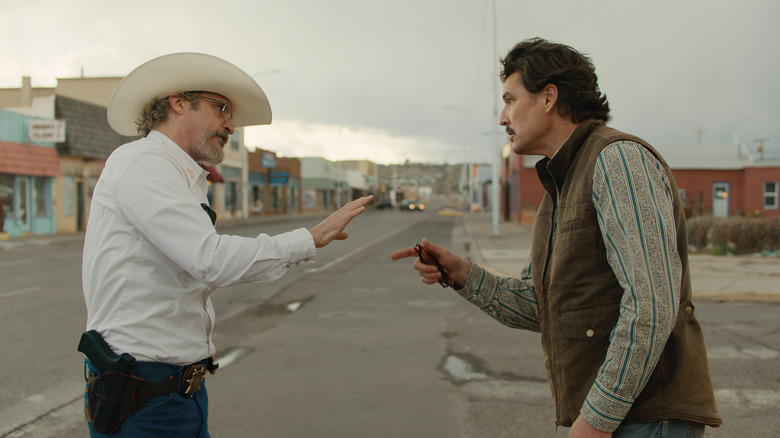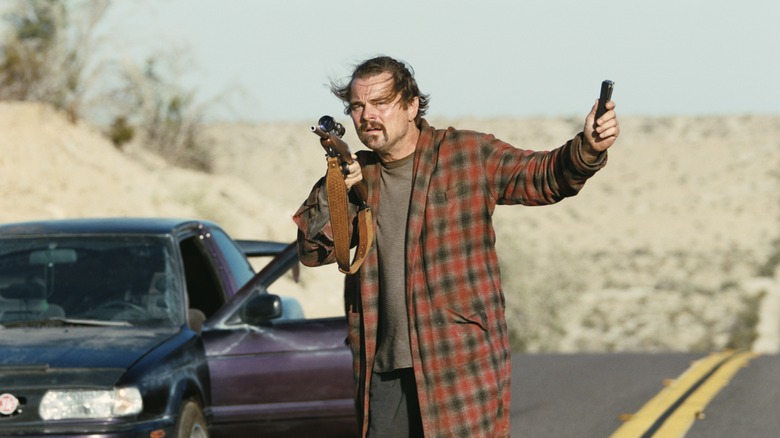One Battle After Another Would Make A Perfect Double Feature With A 2025 Box Office Bomb
Hold on there, just a minute. This article contains spoilers for "Eddington" and "One Battle After Another."
In the most optimistic future I can imagine, we look back on the films of 2025 with a sort of thankful nostalgia — gratitude that the political pandemonium and cultural chaos portrayed didn't last, and instead became window dressing for a very specific era of cinema. It's a stretch, I know. For now, all we have are two particular movies that show the contradictions, grotesqueries, violence, and paranoia of the present moment. I'm talking, of course, about Paul Thomas Anderson's "One Battle After Another" and Ari Aster's "Eddington."
Released just months apart and filmed against similar backdrops of the American southwest, these two films differ pretty starkly when you just look at the synopses. "Eddington" follows the small-town rivalry of a sheriff (Joaquin Phoenix) and mayor (Pedro Pascal) in the midst of the COVID-19 pandemic. There's extensive commentary on big tech, conspiracy theory culture, and the power of the Internet to infect and isolate the brain. On the other hand, "One Battle After Another" is a classic Hollywood action-adventure film, centered on a militant revolutionary group and the fallout of their actions against the U.S. government and military — specifically, the growing military and police campaign against undocumented immigrants.
Both films are deeply grounded in the current American political moment, but it's the way in which they each explore the mania of it that moment in which they really mirror one another. Though Anderson's directorial sentiments typically lean toward the artistic Hollywood drama, and Aster's toward the unsettling realm of horror, both find an unintended middleground in their frequently absurd, entirely overwhelming portrait of contemporary American tension.
Thematic Throughlines between Eddington and One Battle After Another
While both films cover different corners of the current American cultural landscape, so to speak, they're subjects that overlap extensively. In "Eddington," the violence that breaks out on the streets of the titular New Mexico town is fueled by growing pandemic-era paranoia and isolation, but the true collapse of the characters into madness and desperation is powered by unseen, tentacled forces behind the scenes. Sheriff Cross's wife, Louise (Emma Stone), is preyed upon by an Internet-savvy religious cult of conspiracy worshippers, while her mother, stuffed away in the house, falls down the QAnon rabbit hole. These digital drivers of radicalization are set against the town's burgeoning data center project — one that Mayor Garcia, for all his public espousing of progressive ideas, is being bribed to push through.
Protests also form the core set piece of "One Battle After Another," when the grotesque Colonel Lockjaw (Sean Penn) launches a full-blown military assault on the sanctuary city of Baktan Cross under the auspices of rooting out a supposed underground immigrant drug network. His real motivation is finding Willa Ferguson (Chase Infiniti), daughter of former French 75 revolutionaries Bob Ferguson (Leonardo DiCaprio) and Perfidia Beverly Hills (Teyana Taylor). A sexual encounter with Perfidia 16 years prior leads Lockjaw to suspect he might be Willa's biological father, which would throw a wrench in his application to the white supremacist doom cult called the Christmas Adventurers Club.
Once again, the cabal lights the fuses that blow on the streets of Baktan Cross. Both films show more serious violence kicked off by outside agitators — agents of Lockjaw in the case of "One Battle," and more shadowy militants in "Eddington," though the film suggests they may have been sent by the funders of the town's massive data center.
Grotesque chaos in modern America
Even with all of these narrative and thematic parallels, "One Battle After Another" and "Eddington" wouldn't feel so destined for double-feature treatment if not for the specific tone they take to their respective tales of political turmoil. Both Phoenix's Sheriff Cross and Penn's Col. Lockjaw — men of law enforcement, albeit of massively different scales — are painted in equal shades of pitiful, pitiable, incompetent, and deeply cruel. Both conduct brutal violence out of anxiety around the concept of manhood. And both end their stories in grotesque ways that make you want to look away from the screen, even if you believe they ultimately got what they deserved.
His history of interracial relations revealed, Lockjaw is dealt a double death by the cult he craves so desperately (to the point of tears, in his final scenes) to be a part of. When a shotgun blast to the skull doesn't finish him off, they finish him with trickery and an impromptu gas chamber before dumping him down a trash chute — aesthetic Nazism of the least subtle variety. Cross also survives bullet wounds that look fatal at first, which leaves him the extremely disabled figurehead mayor of a town fully sold to the same big tech interests that indirectly drove it to madness.
Anderson's New Hollywood sensibilities provide the only traditional "happy ending" in either film, with Willa taking on her parents' revolutionary tendencies and carrying the torch for the next generation. But even with that positive twinge in the final moments, the film stops far short of providing a feel-good balm to the abject violence — explicit and implicit — of the thing it calls America.


